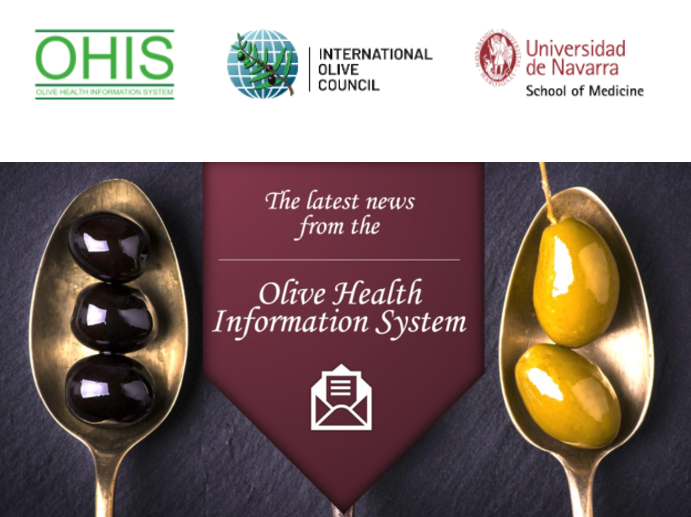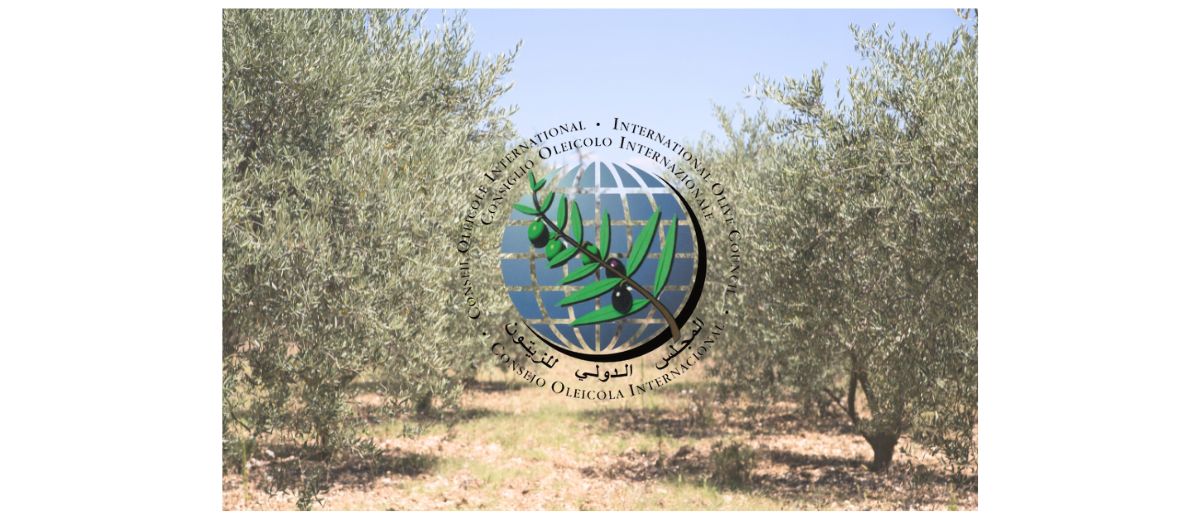The OHIS is the result by an agreement between the International Olive Council, the world’s only international intergovernmental organisation in the field of olive oil and table olives and the School of Medicine of University of Navarra.
| Please see links below sent from https://meddietolivehealth.com |
| Diet and Mental Health |
| The social and psychological health of children is associated with Mediterranean diet adherence items, cardiorespiratory fitness, and lifestyle. |
| The association between antioxidant intake, dietary pattern and depressive symptoms in older Australian men: the Concord Health and Ageing in Men Project. |
| Does diet play a role in the prevention and management of depression among adolescents? A narrative review. |
| Mediterranean Diet |
| Adherence to a Mediterranean diet and health-related quality of life: a cross-sectional analysis of overweight and obese middle-aged and older adults with and without type 2 diabetes mellitus. |
| Cardiovascuar Disease |
| Adherence to Recommended Eating Patterns Is Associated With Lower Risk of Peripheral Arterial Disease: Results From the Women’s Health Initiative. |
| Dietary Interventions and Nutritional Supplements for Heart Failure: A Systematic Appraisal and Evidence Map. |
| A Mediterranean lifestyle is associated with favourable cardiometabolic markers in people with non-dialysis dependent chronic kidney disease. |
| A Mediterranean lifestyle reduces the risk of cardiovascular disease in the « Seguimiento Universidad de Navarra » (SUN) cohort. |
| Fruit consumption and cardiometabolic risk in the PREDIMED-plus study: A cross-sectional analysis. |
| Modifying dietary patterns in cardiothoracic transplant patients to reduce cardiovascular risk: The AMEND-IT Trial. |
| The effect of olive leaf extract on cardiovascular health markers: a randomized placebo-controlled clinical trial. |
| Cancer |
| An updated systematic review and meta-analysis on adherence to mediterranean diet and risk of cancer. |
| Associations of one-carbon metabolism-related gene polymorphisms with breast cancer risk are modulated by diet, being higher when adherence to the Mediterranean dietary pattern is low. |
| Liver Diseases |
| Effect of Mediterranean diet on liver enzymes: A systematic review and meta-analysis of randomized controlled trials. |
| Effects of two personalized dietary strategies during a 2-year intervention in subjects with nonalcoholic fatty liver disease: A randomized trial |
| Metabolic syndrome and lipid metabolism |
| Dietary folate intake and metabolic syndrome in participants of PREDIMED-Plus study: a cross-sectional study. |
| Changes in miRNA expression with two weight-loss dietary strategies in a population with metabolic syndrome. |
| The Interaction Between Fatty Acid Desaturase-2 (FADS2) rs174583 Genetic Variant and Dietary Quality Indices (DASH and MDS) Constructs Different Metabolic Phenotypes Among Obese Individuals. |
| Mortality |
| Mediterranean diet, alcohol-drinking pattern and their combined effect on all-cause mortality: the Seguimiento Universidad de Navarra (SUN) cohort. |
| Inflammation |
| Healthy dietary patterns are associated with lower concentrations of growth differentiation factor 15 in older adults. |
| Sociodemographic Implications in Dietary behaviour |
| Urban environment and dietary behaviours as perceived by residents living in socioeconomically diverse neighbourhoods: A qualitative study in a Mediterranean context. |
| The Cost of Diets According to Nutritional Quality and Sociodemographic Characteristics: A Population-Based Assessment in Belgium. |
| Covid-19 |
| Relationship in dietary habits variations during COVID-19 lockdown in Kosovo: The COVIDiet study. |
| Neurodegenerative diseases |
| Dietary patterns are related to cognitive functioning in elderly enriched with individuals at increased risk for Alzheimer’s disease. |
| Other news |
| A comparison of dietary quality and nutritional adequacy of popular energy restricted diets against the Australian Guide to Healthy Eating and the Mediterranean Diet. |
| Meta-analysis and machine learning-augmented mixed effects cohort analysis of improved diets among 5,847 medical trainees, providers, and patients. |
| Dietary exposure to parabens and body mass index in an adolescent Spanish population. |
| Summary: |
| Rising incidence of cancer constitutes one of the main challenges in public health these days. For this reason, this systematic review turns out to be especially interesting, since it studies the relationship between the adherence to the Mediterranean Diet (MD) and overall cancer risk. Data from studies with different designs assessing different types of cancer (breast, colorectal, prostate, gastric and liver among others) were taken in account for this review. The analyses demonstrated lower risk for certains types of cancer, such as gastric, liver, respiratory or bladder among people who followed faithfully the recommendations of the Mediterranean Diet. |
| Referring to molecular research, GDF-15 is a biomarker related to aging, inflammation and chronic diseases including cardiovascular disease, type 2 diabetes or insulin resistance, and is also a predictor of mortality. Since diet is an important and modifiable factor in health, this study assesses the possible effect of diet quality and aging or chronic diseases onset through the concentration of GDF-15 in older adults, and it is possibly the first study carrying out these associations. One of the diets assessed was the MD, rich in olive oil. The results indicated an inverse correlation between healthy dietary pattern and concentration of GDF-15, suggesting that paying attention to diet quality could lead to a healthy aging. |
| Apart from anthropometric changes, following different type of diets can lead also to changes in miRNA, presumably involved in the development of some diseases, such as obesity and its metabolic comorbidities. In this study participants were encouraged to follow either the MD or the recommendations of the American Heart Association. After 8 weeks, changes in miRNA were analyzed and multiple significant changes were found with both diets. These changes were related with leptin levels (which suggest an adaptation to the diet modifications), triglycerides, glucose, HDL, blood pressure, fat and other parameters. These findings could be useful to develop new biomarkers to personalize nutritional strategies. |
You will find further information reaching this link: https://meddietolivehealth.com/news-by-topic/










